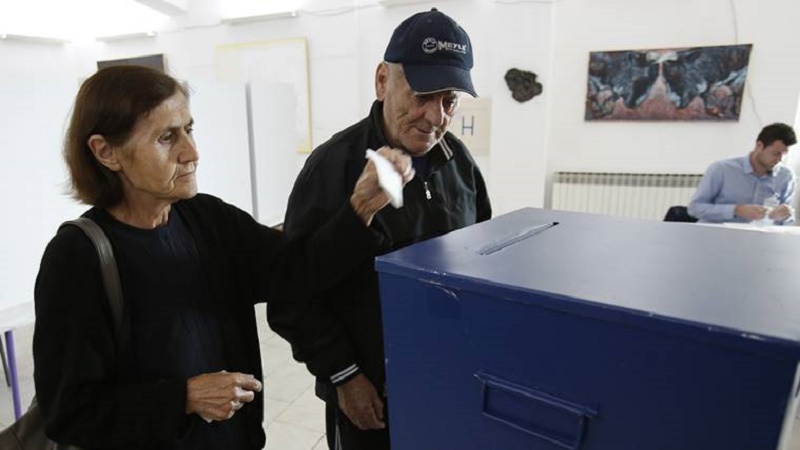Image from Indian Express
On January 9, 1992 the Assembly of the Serb People in Bosnia and Herzegovina (parallel nationalist government) proclaimed the Serbian Republic of Bosnia and Herzegovina as part of Yugoslavia. It was one of many links in the chain of events that resulted in the bloody war, genocide and humanitarian disaster of the 90s.
Three years later, the war finally ended with the signing of the Dayton Peace Agreement, which became the basis for the constitution of the new state. In the Serbian autonomous region, the date continued to be celebrated as “The Day of Republika Srpska” [Republika Srpska is the name of the Serbian autonomous region of Bosnia-Herzegovina]. It seemed convenient considering the fact that on the same date, the Serb Orthodox Church celebrates St. Stephen, who became the patron saint of Republika Srpska.
The latter fact became the basis for the decision that the Constitutional Court of Bosnia and Herzegovina (supreme legal body in the state) made on November 26th 2015. The court proclaimed that the holiday was unconstitutional on account that it neglects the constitutionally guaranteed equal rights of Bosnian Croats and Bosniaks, most of whom are Catholics and Muslims respectively. Republika Srpska was given 6 months to change its law on public holidays and choose some other date. It is 2016 and that still hasn’t happened. The Court’s decision was instantly defied by the Serb government, led by the President of Republika Srpska, Milorad Dodik.
The Serb nationalist leadership announced that it would not obey the court ruling and announced a referendum in the autonomous region. The referendum consisted of a single question: “Do you support that January 9 be celebrated as the Day of Republika Srpska?” The announcement provoked uproar from Croatian and Bosniak nationalist leaders, but also from international officials. There are several reasons for this, but the most important one was the fear of new ethnic conflict in Bosnia which such a one-sided decision could cause.
Among the general population, the word “referendum” itself evokes memories of the pre-war period in Bosnia and Yugoslavia, since some claim that the Bosnian independence referendum of March 1, 1992 was one of the causes for the civil war. Milorad Dodik also used the opportunity to test the will of the Peace Implementation Council (PIC), the international body charged with implementing the Dayton Peace Agreement in Bosnia and Herzegovina, as well as the other foreign powers with power over Bosnia’s political and social life.
In the days preceding the referendum, Dodik went to Serbia and Russia, asking for the support from both Serbian Prime Minister Vučić and Russian president Putin. Official Serbia instantly refused to give its support and go against the will of Western powers, as it continues to move closer to the EU and NATO. Putin decided to give carefully worded “support”, vaguely mentioning the Serb right to a referendum, without giving clear support to this particular event. Dodik and his government were left alone in this endeavor and it was obvious that any gain they would get from it would be short-term, especially considering the upcoming local elections and horrible economic situation in that part of the state.
Finally, the day of the referendum came and the results in voter participation fell far short of what the government hoped for. The results are challenged on many levels because of the reported irregularities and the lack of independent supervision. As published by the Electoral Commission of Republika Srpska on Sunday night and Monday morning a total of 55% of voters participated in the referendum, with 99,8% of those supposedly voting “YES”.
Dodik didn’t receive any congratulations on what he calls a “successful” referendum, even from Serbia or Russia. What he did get though, is a subpoena from the state prosecutors office, since there are clear indications that he broke the law and went against the ruling of the Constitutional Court. He’s defending his position by challenging the jurisdiction that the state court has over him, but he is facing criminal charges and the sentence of up to 5 years of prison.
In Republika Srpska the left is practically non-existent, but there is a moderate right opposition and their response was also fierce. The prevailing opinion is that any meddling with the Dayton Peace Agreement and the Constitution might open the political can of worms which could eventually lead to the cancellation of Republika Srpska´s autonomous status. One way or another, Dodik’s power is weakening.
Local nationalists have seen the referendum as an opportunity to mobilize and rally their respective ethnic communities. They are hoping to distract attention from the people’s anger over the ongoing economic crisis and extremely low standard of life. As they successfully did so many times before, they tried using the usual nationalist rhetoric. This time however, they failed miserably. Disillusioned citizens of Bosnia and Herzegovina took to the media and social networks to widely express their opposition to any future armed conflicts, inviting politicians on all sides to take arms and fight their own wars.
A war already seemed highly unlikely because the current situation is much different from the one in the 90s. An armed conflict would be much harder to mobilize and NATO forces are currently the only real army present. However the people´s reaction against war shows that the nationalist grip over the hearts and minds of Bosnia’s people is considerably weakened.
Years of struggle for survival have undermined the ideological power of nationalist elites. These criminal nationalist and political elites impoverished the country and ruined the lives of many. Hopefully, the next time the people of Bosnia and Herzegovina pick up arms it will be to use them against their own politicians and ruling elite, as they did in certain parts of the country in 2014.










